

30 Shocking Photos Of Child Labor Between 1908 And 1916. List of emperors of the Ming Dynasty. The Ming dynasty ruled China from 1368 to 1644, succeeding the Mongol-led Yuan dynasty and falling amidst much peasant turmoil to the Manchu-ruled Qing dynasty.
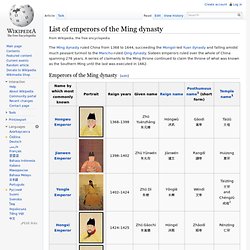
List of emperors of the Ming Dynasty. Aztec. Large ceramic statue of an Aztec Eagle Warrior The Aztec /ˈæztɛk/[1] people were certain ethnic groups of central Mexico, particularly those groups who spoke the Nahuatl language and who dominated large parts of Mesoamerica from the 14th to 16th centuries.
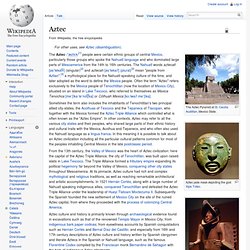
What was life like for children in Victorian London? Tudor Children. When a child was born it was washed in warm water and then to keep it warm it was rubbed with butter or rose oil.

The baby was then swaddled (wrapped in cloths like bandages). Normally the baby was baptized within a few days because the risk of it dying was so high. Ordinary Tudor women breast fed but upper class women gave their baby to a wet nurse to be fed. Babies were swaddled until they were 8 or 9 months (sometimes longer) and most of the time they were laid in a wooden cradle and allowed to sleep.
Children were weaned between 1 and 2 years old and they if their parents could afford it they were given a stick of coral to chew on when they were teething. Little boys wore gowns or skirts but when they were 6 or 7 they were given their first breeches (short trousers). Tudor boys usually went to a kind of nursery school called a 'petty school' first then moved onto grammar school when they were about seven.
His story, her story: What was it like to be a child in Tudor times ? Today we value our children's early years as a time of innocence and important formative experiences.
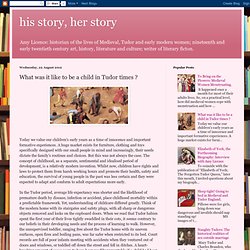
A huge market exists for furniture, clothing and toys specifically designed with our small people in mind and increasingly, their needs dictate the family's routines and choices. But this was not always the case. The concept of childhood, as a separate, sentimental and idealised period of development, is a relatively modern invention. Whilst now, children have rights and laws to protect them from harsh working hours and promote their health, safety and education, the survival of young people in the past was less certain and they were expected to adapt and conform to adult expectations more early. Www.artsci.wustl.edu/~ksawyer/classes/313_history_lecture.pdf. Radio 4 - The Invention of Childhood. 1666 in England. Incumbents[edit] Monarch - King Charles II Events[edit] London, as it appeared from Bankside, Southwark, During the Great Fire — Derived from a Print of the Period by Visscher Undated[edit] Publications[edit] Thomas Hobbes' work De principiis et ratiocinatione geometrarum.
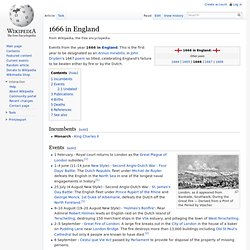
Births[edit] Deaths[edit] References[edit] See also[edit] Nicolaus Copernicus. Nicolaus Copernicus was born in Thorn, Poland on February 19, 1473.
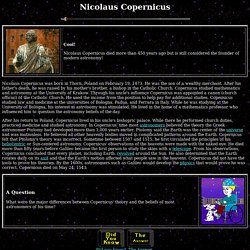
He was the son of a wealthy merchant. After his father's death, he was raised by his mother's brother, a bishop in the Catholic Church. Copernicus studied mathematics and astronomy at the University of Krakow. Through his uncle's influence Copernicus was appointed a canon (church official) of the Catholic Church. He used the income from the position to help pay for additional studies. After his return to Poland, Copernicus lived in his uncle's bishopric palace. Nicolaus Copernicus Biography. Astronomer Nicolaus Copernicus was instrumental in establishing the concept of a heliocentric solar system, in which the sun, rather than the earth, is the center of the solar system.

Synopsis Nicolaus Copernicus was born on February 19, 1473 in Torun, Poland. Circa 1508, Copernicus developed his own celestial model of a heliocentric planetary system. History - Copernicus. The First Modern Olympics: Athens, 1896. By John Gettings "I hereby proclaim the opening of the first International Olympic Games at Athens.
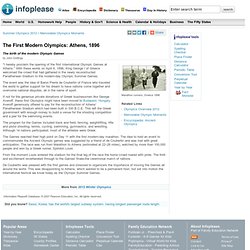
" With these words on April 6, 1896, King George I of Greece welcomed the crowd that had gathered in the newly reconstructed Panathenean Stadium to the modern-day Olympic Summer Games. The event was the idea of Baron Pierre de Coubertin of France who traveled the world to gather support for his dream to have nations come together and overcome national disputes, all in the name of sport. If not for the generous private donations of Greek businessmen like George Averoff, these first Olympics might have been moved to Budapest, Hungary. Averoff generously offered to pay for the reconstruction of Athens' Panathenean Stadium which had been built in 330 B.C.E. Olympic Games. The modern Olympic Games (French: Jeux olympiques[1]) are the leading international sporting event featuring summer and winter sports competitions wherein thousands of athletes variously compete.
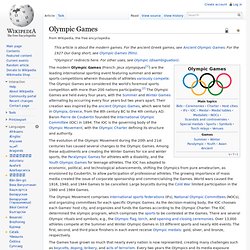
The Olympic Games are considered the world's foremost sports competition with more than 200 nations participating.[2] The Olympic Games are held every four years, with the Summer and Winter Games alternating by occurring every four years but two years apart. Athens 1896 Summer Olympics. History of the Olympics - 1896 Olympic Games in Athens. The 1896 Olympic Games in Athens, Greece The very first modern Olympic Games opened in the first week of April 1896.
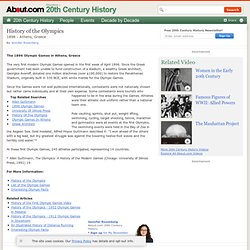
Since the Greek government had been unable to fund construction of a stadium, a wealthy Greek architect, Georgios Averoff, donated one million drachmas (over $100,000) to restore the Panathenaic Stadium, originally built in 330 BCE, with white marble for the Olympic Games. Since the Games were not well publicized internationally, contestants were not nationally chosen but rather came individually and at their own expense. Some contestants were tourists who happened to be in the area during the Games. Athletes wore their athletic club uniform rather than a national team one. The Assassination of Abraham Lincoln . American Experience . WGBH. The Death of President Lincoln, 1865. The Death of President Lincoln, 1865 Lincoln awoke the morning of April 14 in a pleasant mood. Robert E. Lee had surrendered several days before to Ulysses Grant, and now Lincoln was awaiting word from North Carolina on the surrender of Joseph E.
Johnston. Abraham Lincoln's Assassination — History.com Articles, Video, Pictures and Facts. Abraham Lincoln’s killer, John Wilkes Booth, was a Maryland native born in 1838 who remained in the North during the Civil War despite his Confederate sympathies. As the conflict entered its final stages, he and several associates hatched a plot to kidnap the president and take him to Richmond, the Confederate capital. However, on March 20, 1865, the day of the planned kidnapping, Lincoln failed to appear at the spot where Booth and his six fellow conspirators lay in wait.
Two weeks later, Richmond fell to Union forces. In April, with Confederate armies near collapse across the South, Booth came up with a desperate plan to save the Confederacy. Learning that Lincoln was to attend Laura Keene’s acclaimed performance of “Our American Cousin” at Ford’s Theatre in Washington, D.C., on April 14, Booth—himself a well-known actor at the time—masterminded the simultaneous assassination of Lincoln, Vice President Andrew Johnson and Secretary of State William H.
Italian Renaissance. Www.schoolhistory.co.uk/year8links/other/renaissance.pdf. Italian Renaissance (1330-1550) The Italian Renaissance (1420-1600)